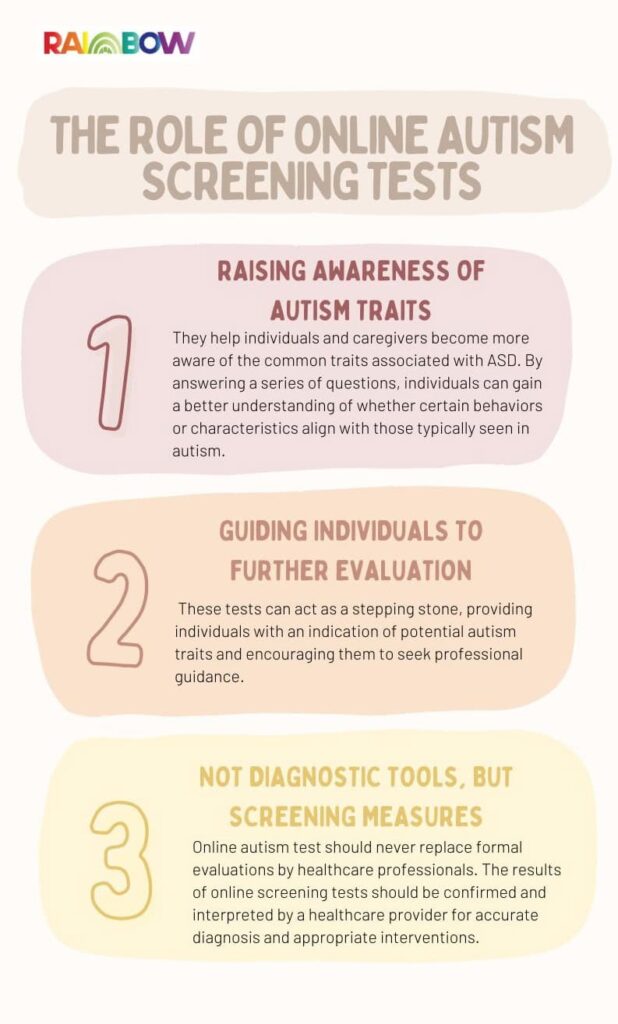Somewhere along the way, you probably stumbled upon the RAADS-R, the ASQ or the AQ (It’s on my home page) or other screeners for autism. These tools can be good at identifying autistic traits. They can help identify potential characteristics associated with autism and can provide provide you with an initial understanding of whether further evaluation is warranted. I like looking at the results because they can inform some of the evaluation. Almost everyone who comes here for an assessment has scores indicating autism may be a possibility for them.
Are the quizzes diagnostic?
The short answer is … no. Online quizzes are self-assessment tools designed to evaluate certain traits associated with autism spectrum disorder in adults. They are made up of a series of questions related to social interaction, communication skills, sensory sensitivities, and repetitive behaviors. The quizzes offer insights into whether you might be exhibiting traits commonly associated with autism.
Online autism tests are not diagnostic tools though. They cannot provide a diagnosis of autism. Instead, they act as a starting point for individuals who suspect they might be autistic. Although they are private and easily accessible, they can’t offer the comprehensive evaluation of your medical history, developmental history, and provide direct observations of your behaviors. This is why an evaluation with a specialist is recommended.
What is wrong with online quizzes?
-
Subjectivity with self-reports/other reports:
Online quizzes rely on self or other reports of behaviors, which can be biased by personal interpretation and perception, leading to inaccurate results.
-
Lack of direct observation:
A trained professional can observe subtle social cues and behaviors during an assessment, which cannot be fully captured through an online quiz. These include hand gestures, head nodding, eye contact, and facial expressions. Direct observations also assess reciprocal conversation and an understanding of social expectations.
-
Limited contextual information:Online quizzes can’t gather important details about an individual’s developmental history.
Say what? Why should I use them then? Because they offer information about you and how you see yourself or how others perceive you and can provide some valuable information.
I got an evaluation and I found out that I am autistic
It feels good to be validated and now you can move on to finding the resources that we discussed including:
- Going to the Autism Society of Minnesota website and looking for their support groups, seminars, workshops, and biweekly coffee get-togethers
- Finding a good autism coach, like The Autistic Mentor.
- Coming up with accommodations for work and school.
I know we spent some time talking about resources tailored just to you and I’m always here as a resource.
My evaluation results were not as I expected
I got a diagnosis other than autism (or no diagnosis) and I’m pretty surprised. I think I have been misdiagnosed. This is a hard place to be. You have conceptualized yourself as being on the autism spectrum and have been able to identify traits that you feel fit for you. You might have even been welcomed into a very friendly neurodivergent community and that is great! Stay there. The MIGDAS-2 is a pretty good assessment that looks at autistic traits. Like the other assessments that address autism, it is not perfect. I recommend that people seek out a second evaluation if they are unhappy with their results.
Adults mask, and you missed the fact that I was masking. That’s a tricky one. Masking behaviors can be hard to identify, but often they are observed when individuals emotional expressions don’t match their facial expressions, they change their tone of voice to match mine, and their answers seem scripted. Also, sometimes, I notice changes in body language to match mine, or mimicking of my facial expressions or hand gestures. In fact, I look specifically for these behaviors and more throughout the interview and assessment process.
What about the Social Responsiveness Scale (SRS-2): Although it is primarily used to look at social communication difficulties inherent in autism, the SRS-2 can reflect social communication difficulties in social anxiety disorder and ADHD. The SRS-2 is another screening tool, and is in itself, not diagnostic.
For more information about diagnosing autism in adults with the DSM-5-TR, visit Autism in Adults. There is a spreadsheet halfway down the page with the criteria.
What’s next?
Follow up with your healthcare provider or therapist and discuss the results in detail. If you need more resources, or have questions about the assessment, I am happy to meet with you and provide clarification or direction.
